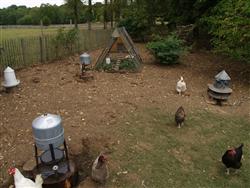
The philosophy at the heart of organic farming is to work with the cycles of nature rather then against them
Organic farmers see their farms as a 'whole' (but closed) system; they try to minimise outside inputs, even those that are organically approved. Although organic farming will not solve all the economic problems inherent in modern farms, there is a definite trend towards organic produce.
This course provides the student with a solid understanding of the systems and management techniques of organic farming, for both crops and livestock.
Field trips for research purposes are required.